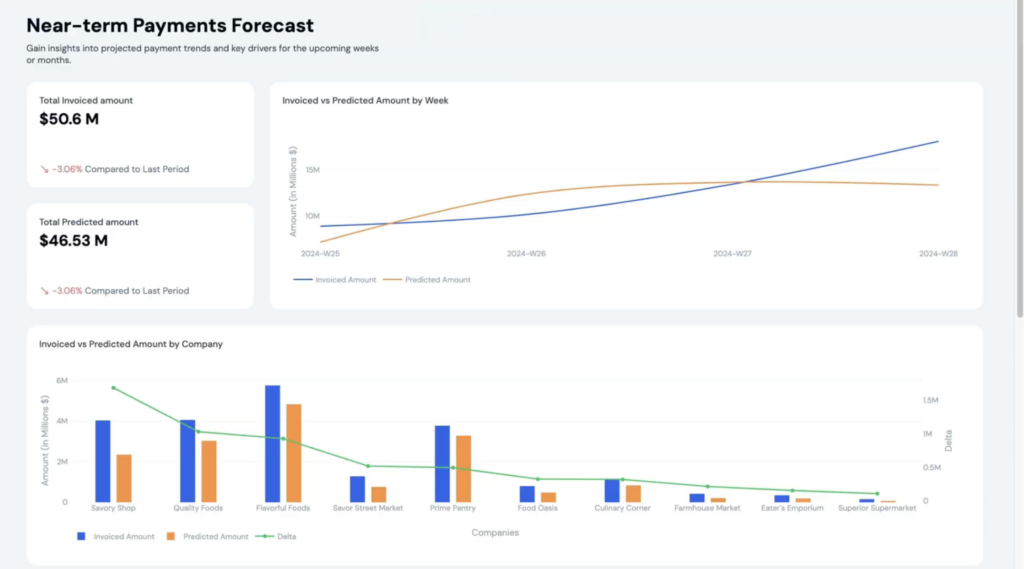Each CFO is aware of the strain of constructing high-stakes monetary selections with restricted visibility. When money circulate forecasts are off, companies scramble, counting on pricey short-term loans, lacking monetary targets, and struggling to optimize working capital.
But, most forecasting instruments depend on static assumptions, forcing finance groups to react relatively than plan strategically.
This outdated strategy leaves companies susceptible to monetary instability. In truth, 82% of enterprise failures are resulting from poor money circulate administration.
AI-powered forecasting adjustments that dynamic, enabling CFOs to anticipate money circulate gaps earlier than they grow to be monetary setbacks.
The money circulate blind spot: The place forecasting falls brief
Money circulate forecasting challenges value companies billions. Practically 50% of invoices are paid late, resulting in money circulate gaps that power CFOs into reactive borrowing.
With out real-time visibility, finance groups wrestle to anticipate money availability, reply to fluctuations, and stop shortfalls earlier than they grow to be a disaster.
But, many organizations nonetheless depend on guide reconciliation processes that may take weeks, pulling information from disparate sources and leaving little time for strategic decision-making. By the point experiences are finalized, the knowledge is already outdated, making it unattainable to plan with confidence.
The consequence is inaccurate forecasts that result in last-minute borrowing, unplanned curiosity bills, and heightened monetary threat.
As an alternative of proactively managing money circulate, CFOs are left scrambling to plug monetary gaps.
To interrupt this cycle, finance leaders want a wiser, extra dynamic strategy that strikes on the velocity of their enterprise as a substitute of counting on static experiences.
How AI transforms money circulate forecasting
AI has the facility to offer CFOs the readability and management they should handle money circulate with confidence.
That’s why DataRobot developed the Money Circulate Forecasting App.
It permits finance groups to maneuver past static experiences to adaptive, high-precision forecasting, serving to them anticipate dangers and alternatives with higher confidence.
By analyzing payer behaviors and money circulate patterns in actual time, the app improves forecast accuracy, permitting finance leaders to:
- Anticipate money availability
- Optimize working capital
- Scale back reliance on short-term borrowing.
With higher visibility into future money positions, CFOs could make knowledgeable selections that decrease monetary threat and enhance general stability.
Let’s have a look at how a number one firm leveraged AI-driven forecasting to enhance monetary efficiency.

How DataRobot is enhancing money circulate at King’s Hawaiian
For Client Packaged Items corporations like King’s Hawaiian, money circulate forecasting performs a crucial function in managing manufacturing, provider funds, and general monetary stability.
With gross sales spanning grocery chains, on-line platforms, and retail channels, fluctuations in money circulate can result in important disruptions, from manufacturing delays to strained provider relationships, and even elevated borrowing prices.
To enhance forecasting accuracy and higher handle working capital, King’s Hawaiian carried out DataRobot’s Money Circulate Forecasting App.
Utilizing AI-driven insights, the corporate refined its forecasting course of and noticed measurable enhancements, together with:
- 20%+ discount in curiosity bills. Extra correct forecasting lowered reliance on last-minute borrowing, decreasing general financing prices.
- Improved money circulate visibility. Finance groups had a clearer view of money reserves, permitting for higher short-term planning and decision-making.
- Operational stability. With higher forecasting, the corporate was capable of forestall funding gaps that would disrupt manufacturing and distribution.
Extra exact money circulate predictions helped King’s Hawaiian cut back monetary uncertainty and enhance short-term planning, enabling the finance group to make extra knowledgeable selections with out counting on reactive borrowing.
Getting an edge with adaptive, AI-driven forecasting
Conventional forecasting instruments depend on inflexible assumptions. AI-driven forecasting learns from precise payer conduct, constantly refining predictions to mirror actual monetary circumstances.
This strategy improves forecasting precision right down to the bill degree, serving to CFOs anticipate money circulate tendencies with higher accuracy.
AI-driven forecasting helps your group:
- Scale back cost dangers. Establish potential late or early funds earlier than they affect money circulate.
- Get rid of billing blind spots. Examine forecasts to actuals to identify discrepancies early.
- Optimize inflows. Acquire real-time visibility into anticipated money motion.
- Decrease short-term borrowing. Scale back reliance on last-minute loans by enhancing forecast accuracy.
- Management free money circulate. Alter spending dynamically primarily based on predicted money availability.
By seamlessly integrating with techniques like SAP and NetSuite, AI eliminates the necessity for guide information pulls and reconciliation, letting finance groups deal with strategic, proactive decision-making.
Good CFOs plan. Nice CFOs use AI.
To transition from reactive to proactive monetary operations, companies should embrace AI-driven forecasting.
With AI, CFOs acquire the power to foretell money circulate gaps, optimize working capital, and make sooner, extra exact monetary selections, all of which drive higher monetary stability, safety, and effectivity.
Take management of your money circulate administration and enhance forecasting—e book a personalised demo with our consultants at this time.
In regards to the writer

Vika Smilansky is a Senior Product Advertising and marketing Supervisor at DataRobot, with a background in driving go-to-market methods for information, analytics, and AI. With experience in messaging, options advertising, and buyer storytelling, Vika delivers measurable enterprise outcomes. Earlier than DataRobot, she served as Director of Product Advertising and marketing at ThoughtSpot and beforehand labored in product advertising for information integration options at Oracle. Vika holds a Grasp’s in Communication Administration from the College of Southern California.

